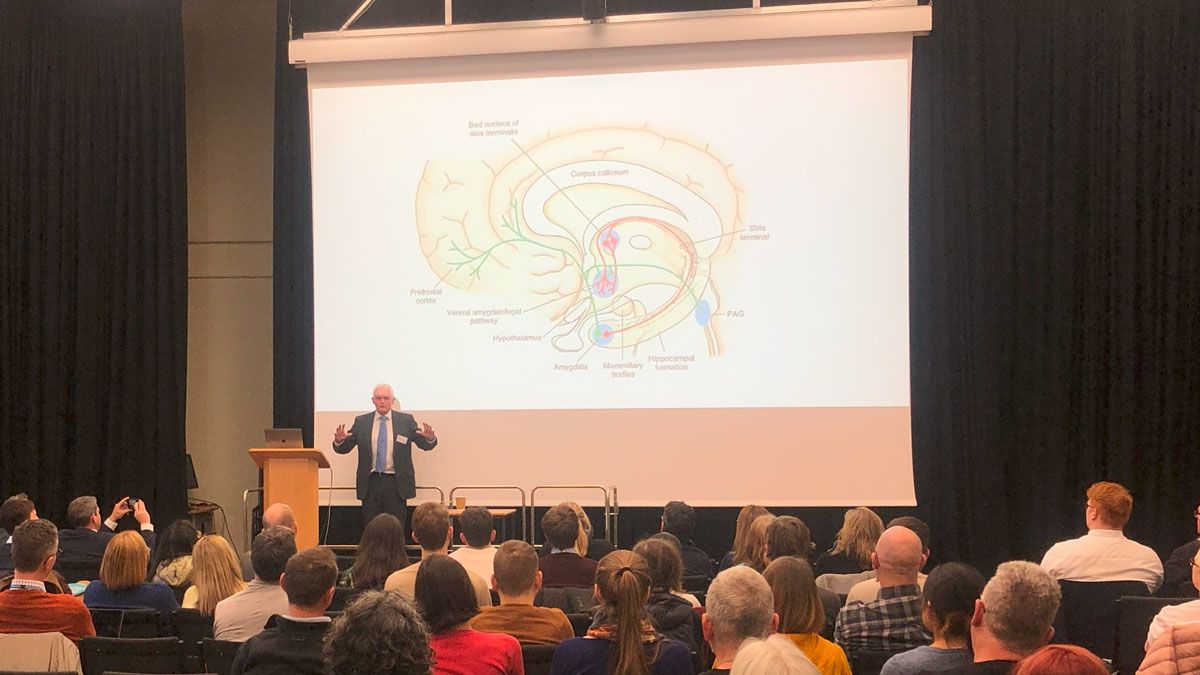

Cambridge partnership teachers to join trials exploring whether ‘Mind-management’ model beats burnout

Teachers from the University of Cambridge’s partnership schools will participate in follow-up trials of a mind management programme that evidence suggests could reduce burnout and improve wellbeing in the profession.
The trials will test the ‘Chimp Model’, an approach to self-management and personal development devised by the renowned psychiatrist, Professor Steve Peters. It proposes that our brains have an emotional and impulsive ‘Chimp’ that competes, sometimes unproductively, with our rational thinking, and that can be managed to help us to get the best out of ourselves and others.
While The Model has proven effective in other sectors, it has not been fully tested in education. The benefits could be considerable, as reported cases of poor teacher well-being and mental health are rising, contributing to a nationwide teacher retention crisis.
The forthcoming trials will build on an earlier feasibility study which was conducted in partnership with the University’s Faculty of Education and showed promising results. In the follow-up, recently qualified teachers and Special Educational Needs and Disability (SEND) co-ordinators will participate in a programme of eight workshops to further test The Model’s effectiveness.
They will include volunteers from the Cambridge PGCE partnership, a network of about 300 schools that help to plan, run and develop the University’s initial teacher education courses. An introductory event at the Faculty of Education, bringing together teachers, school mentors, academics and neuroscientists to discuss The Model, took place on 25 April.
For beginning teachers, there’s often a lot of emotional challenge associated with having to deal with children, parents and colleagues in a setting where unexpected things can happen.
Jane Warwick, PGCE Primary Programme Manager at the Faculty of Education, believes that The Chimp Model could be particularly useful for those entering the profession for the first time.
“Potentially, the idea has real mileage in initial teacher education,” she said. “For beginning teachers, there’s often a lot of emotional challenge associated with having to deal with children, parents and colleagues in a setting where unexpected things can happen. The Chimp Model provides a really useful framework for handling that, and is one of a number of tools new teachers can draw upon.”
The framework is based on Peters’ 2012 book, The Chimp Paradox, and more recently A Path through the Jungle; A Psychological Health and Wellbeing Programme to Develop Robustness and Resilience (2021), and helps individuals manage emotions, thoughts and behaviours. Founded on ideas in contemporary neuroscience, it imagines the brain as comprising three subsystems, labelled the ‘human’, ‘computer’ and ‘chimp’. The Chimp is emotional and impulsive, and can sometimes conflict with the human brain’s decision-making. By managing it we can make better decisions, communicate more clearly and can handle stress more easily.

After using some of these ideas in their own work, Warwick and a Faculty colleague approached Peters’ company, Chimp Management, in 2017 to discuss using his ideas in education and the possibility of formal research to validate this. This resulted in a feasibility study involving 184 teachers and school staff, including about 80 from the University of Cambridge’s partnership schools alongside others from the North and Midlands. The study, run by the Rotherham, Doncaster and South Humber Centre for Psychological Research (RDaSH), aimed to determine whether an eight-workshop psychoeducational intervention based on The Chimp Model, called the Skills for Life programme, could improve teachers’ well-being.
Teachers’ burnout levels and well-being were measured before, during and after the programme using two standard tools (the Oldenburg Burnout Inventory and the Warwick-Edinburgh Mental Well-being Scale). In addition, the research used Chimp Management’s own rating scale, which asks participants to rate, on a scale of 1-10, characteristics such as self-awareness, stress management and resilience. It found that the programme significantly reduced burnout and improved the teachers’ overall well-being. The Chimp Management rating scale showed an average improvement of 23.7% over the eight-session period, which was endorsed by the more formal measures.
Participating teachers also responded very positively. One, a school leader, reflected: “I feel that I am finally getting to know and really appreciate myself as a person. I am able to deal more calmly with last-minute changes and irritating situations at school, often asking for support from colleagues – something I would not have done previously.”
It’s exciting to see the impact the programme now seems to be having in different areas and the response from teachers has been very positive.
These results are in line with a formal study conducted within the NHS, the results of which have recently been published in the Journal of Mental Health. Another eight-week workshop intervention was delivered virtually to 200 community nurses during 2020. Half the nurses were randomly assigned to an immediate intervention group, while the other half joined a ‘waitlist’ group which received the intervention after a delay. The results again showed a statistically significant reduction in burnout and increase in well-being. Both groups also maintained these improvements six months after the intervention. Importantly, the immediate intervention group showed much better well-being and lower burnout before the waitlist group received the intervention. As would be expected of a successful intervention, the gap then narrowed as the waitlist group also underwent the programme.
With evidence of The Chimp Model’s effectiveness now mounting, the new trials will return to studying their possible benefits in education. These could be substantial: the latest Teacher Wellbeing Index, for example, surveyed more than 3,000 education staff and found that 59% had considered leaving the sector during the previous academic year due to pressures on their mental health. More than a quarter (28%) reported burnout.
In line with Jane Warwick’s view that the approach could particularly benefit new teachers and those working with students with particular needs, the forthcoming study will involve recently-qualified professionals and SEND co-ordinators. It will be led by the University of Derby, but will again involve participants from Cambridge’s partnership schools.
“It’s exciting to see the impact the programme now seems to be having in different areas and the response from teachers has been very positive,” Warwick said. “We await the results of these new trials with interest.”
Image in this story: Adulbosit Melikuziev, Unsplash.